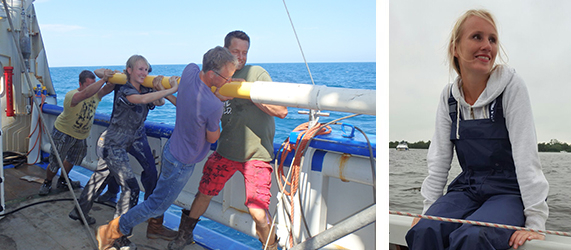Sea water salinity, i.e. salt content, is an important, but challenging parameter to reconstruct in paleoceanography. Changes in salinity mostly reflect shifts in the hydrological cycle, and on longer (geological) timescales also the waxing and waning of continental ice sheets, sea ice formation and regional and global circulation of water masses. Together with temperature, salinity controls density of seawater, driving large scale ocean circulation thereby redistributing oxygen, heat and nutrients worldwide. Reconstructions are often based on the calcite shell remains of foraminifera, which are small organisms living in the sea. At higher salinities, foraminifera incorporate more sodium (Na) into their calcite shells, thereby providing a potential tool to reconstruct salinities. The accuracy of these reconstructions depends on the fundamental understanding of incorporation and preservation of Na in their shells.
My PhD research focuses on the development and validation of foraminiferal Na/Ca as a proxy for salinity. Existing calibrations for benthic species are complemented by those for planktonic foraminifera, as these are often used in paleoceanography to reconstruct surface water conditions. The relation between foraminiferal shell Na and salinity is investigated in the Red Sea, also testing the effect of transport through the water column and deposition at the sediment surface. Furthermore, the inter- and intra-specimen and species variability in incorporated sodium are studied, as well as the underlying mechanisms via inorganic calcite precipitation experiments. The applicability of this novel proxy is tested by applying it to an Arabian Sea sediment record, covering the last ~80 thousand years of change in a monsoon dominated ocean basin.
Eveline Maryse Mezger was born the 11th of August 1989 in Nijmegen, the Netherlands. She enrolled in the Bachelor Earth Sciences at Utrecht University and graduated in 2010. In the same year, she started her MSc degree in ‘Biogeology’ at Utrecht University, from which she graduated in 2013. Her MSc thesis was titled ‘How dry was the Messinian Salinity Crisis? - A molecular biogeochemical study of the Eraclea Minoa (Sicily) section, Italy -’. This MSc research was followed-up by an internship at Shell, in which she learned many high-tech organic geochemical techniques. In 2013, she started as a PhD candidate at the Royal Netherlands Institute for Sea Research (NIOZ), supervised by Prof dr Gert-Jan Reichart and dr Lennart de Nooijer. During her PhD, she focused on the foraminiferal Na/Ca (salinity) proxy potential.
Eveline will defend her thesis, entitled: ‘Controls on sodium incorporation in foraminiferal calcite’ on May 6th, 2019, in Utrecht.
